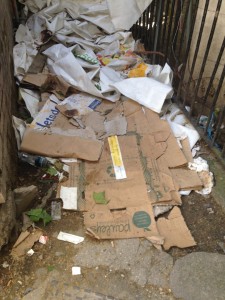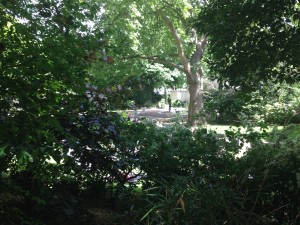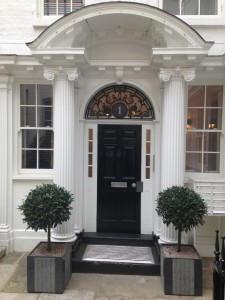Running a portfolio of activities is great. It has downsides though: The feeling of anxiety about what’s next; or guilt at taking a time out to do pro bono work when I could be responding to a request from a prospective client. And like every business marketing and relationship management has its cost.
But yesterday I decided to take a time out to reflect and think about the closing session at KMUK which I’ve been asked to lead. And this is how I ended up walking the streets.
John Blackwell is someone I met many years back while he was an IBM’er. His ‘new’ organisation Quora devotes much of their time to help organisations think about the future of work and workspace. Those who follow what I write will know working environments (space: virtual and physical) is a topic I feel neglected in Knowledge Management strategies and implementation plans.
mobile knowledge cafe in the street?
When John invited me to attend an afternoon session run by Street Wisdom at the Royal Society of Arts as part of his Smartworking Summit I was intrigued as the concept has caught on around the globe and seemed to be a sort of Knowledge Cafe in the street. Here’s what happened:
- Scene setting: David, Chris and Mel, explained what was about to happen over the next 3 hours. In a pre-session discussion I’d described my ‘doctrine’ of Orchestrated Serendipity and that was used to illustrate what might happen. This is what we did.
- A
 wareness: Having assembled in 3 groups of 6 outside of the RSA we were invited to go off on our own for 8 minutes and observe – our choice, what we see and record. I noticed this pile (and someone’s bed) not 100 yards from this lovely peaceful spot.
wareness: Having assembled in 3 groups of 6 outside of the RSA we were invited to go off on our own for 8 minutes and observe – our choice, what we see and record. I noticed this pile (and someone’s bed) not 100 yards from this lovely peaceful spot.
- Slow: Back at ‘base’ we were asked to go off again at a very slow pace to see whether what we noticed is different because we have slowed down. My immediate emotion was of being in a bubble as everyone around me hurried about their business. Certainly I was more attuned to ‘things’ and it felt like I do at airports where I often switch off and withdraw in as a way of coping with the vagaries of travel. My 8 minutes over I return to ‘base’.
- Patterns: With my new ‘friend’ Mark from Sheffield I set off in search of patterns. This was interesting. As we walked we reflected on how we had already seen things we’d not normally see. We parted, me to Caffe Nero, he to the pub, both to watch. I noticed: in a cafe people give themselves permission to talk; no one seems to use a paper map anymore, they use their smartphones; buses do come along in threes.
 Beauty: If the 8 minutes searching for patterns seemed a bit frivolous, 8 minutes looking for beauty (definition: ‘in the eye of the beholder’) was revealing. Literally 400 years from the rubbish and garden, up a twitten off The Stand I came across this magnificent abode which was being shown to a young Asian Student and his father. Amid the hustle and bustle of The Strand here was an oasis (at a price-1 bedroom starting at £895k!) which was aesthetically pleasing.
Beauty: If the 8 minutes searching for patterns seemed a bit frivolous, 8 minutes looking for beauty (definition: ‘in the eye of the beholder’) was revealing. Literally 400 years from the rubbish and garden, up a twitten off The Stand I came across this magnificent abode which was being shown to a young Asian Student and his father. Amid the hustle and bustle of The Strand here was an oasis (at a price-1 bedroom starting at £895k!) which was aesthetically pleasing.- Burning question: Fired up and ready to go I returned for my last task assignment. I was to go off for 30 minutes to answer a burning question. In my case this was to think about how I was going to run the forthcoming closing session at KMUK.
- Plenary: All valuable interventions end with a debrief / reflection session. Here we sat in a circle and shared what we’d seen and done. This was a precursor to a more expansive group conversation among two dozen people drawn from HR/Change/Facilities Management functions.
observations from plenary
The plenary session was stimulating: some worked virtually, others from Academia did a combination of home and away. Here’s what emerged:
- While virtual working is hugely advantageous to many, not everyone’s personal circumstances or culture fits. Last week in Hong Kong I realised that with personal space at such a premium work has to take place away from the home. One virtual worker also noted that as a mother the flexibility is essential for her. She did note though that personal contact is essential to make sure a virtual team functions to its optimal level.
- The grouping of people around a central office or campus is declining. One view was that the Google and Facebook campus facilities are the last hurrah for this type of environment.
- The future is about creating community hubs (closer to where people live) that permit drop out/drop in attendance based on a concierge hotel style service.
- Current contractual arrangements are too restrictive and Zero hour contracts exploitative and not conducive to creating the element of trust needed for a different approach to task management. We discussed the idea of giving staff ‘space cards’ which they can redeem against usage at such approved venues.
- No one is training us to work in the new way or in virtual teams and the training should begin in schools.
- Digital was an adjective, now its a noun and with Bring Your Own Devices (BYOD) we are entering an era of extreme customisation of the workplace by the consumer.
- No one ‘owns’ the topic at a senior level. Like Knowledge Management ways of working and workspace environment is seen as being a horizontal function straddling many disciplines.
my takeaways
- The next 5 years will see an accelaration in the growth of the generic workspace.
- ‘No one can speak twice until everyone has spoken once’ was a lovely approach from David Pearl (Founder of Street Wisdom) to ensure everyone in the plenary session got their say.
- People and conversations matter, in fact they are vital for innovation and knowledge sharing: people share not technology. I realised halfway through the session how important it is to have the imaginery ‘water cooler’ or coffee station area where you can go to share and be stimulated. By listening to others I was able to craft an agenda which otherwise I might have struggled with.
- Street Wisdom worked for me when I recognised I had given myself permission to take time to slow down and reflect. It is an effective way of changing mindset and a case of: ‘when you look at things differently, the things you look at change.’
- And finally, I managed to create a wrap up session for next week’s KMUK event. Watch this space to see what I did and how it went.
one to watch
Re-Imagining Work remains one of my all time favourite videos. Dave Copin imagines what might be possible if more organisations embraced the empowering potential of technology and encouraged a truly open working culture. It is a great accompaniment to this discussion and one I use frequently to stimulate a debate.
